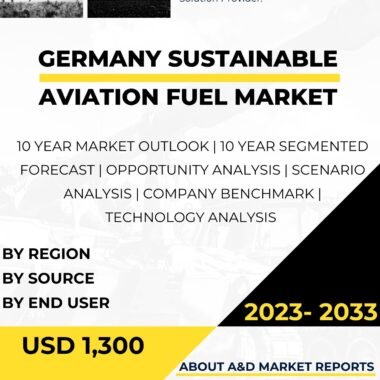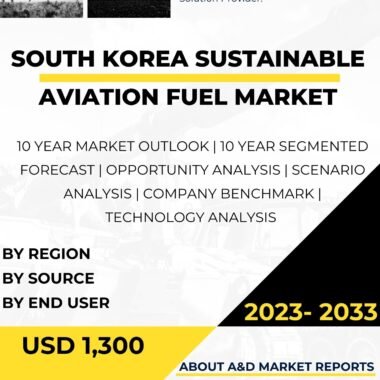Description
The Saudi Arabia Sustainable Aviation Fuel (SAF) Market is an emerging and strategically important segment within the country’s energy and aviation industries. Sustainable aviation fuel, also known as biojet fuel or renewable jet fuel, is a type of aviation fuel produced from renewable feedstocks, such as plant-based oils, agricultural residues, and waste materials. As a major player in the global aviation sector and a country with significant energy resources, Saudi Arabia recognizes the importance of sustainable aviation fuel in reducing greenhouse gas emissions, enhancing energy security, and meeting international sustainability goals.
The Saudi Arabia Sustainable Aviation Fuel Market is characterized by a growing interest in sustainable and environmentally friendly solutions in the aviation sector. The country’s aviation industry is experiencing increasing pressure to reduce its carbon footprint and align with global efforts to combat climate change. As a result, sustainable aviation fuel is becoming a key focus area for airlines, airports, and the government.
One of the primary drivers of the Saudi Arabia Sustainable Aviation Fuel Market is the country’s commitment to environmental sustainability and its role in the global energy transition. As a signatory to the Paris Agreement and a member of the International Civil Aviation Organization (ICAO), Saudi Arabia is actively engaged in efforts to reduce greenhouse gas emissions from aviation.
Sustainable aviation fuel offers a viable solution to reduce the aviation sector’s carbon dioxide (CO2) emissions and contributes to the country’s broader efforts to diversify its energy sources and promote sustainable practices.
The Saudi government’s Vision 2030 economic diversification plan also influences the Sustainable Aviation Fuel Market. As part of this vision, Saudi Arabia aims to diversify its economy and reduce its dependence on hydrocarbon exports. The development and adoption of sustainable aviation fuel align with this goal and present an opportunity for the country to showcase its commitment to environmental stewardship on the global stage.
The development of a robust SAF production infrastructure is a critical aspect of the market. The production of sustainable aviation fuel involves advanced technologies, such as hydroprocessing and Fischer-Tropsch synthesis, to convert renewable feedstocks into drop-in jet fuel replacements. Saudi Arabia’s abundant land and solar resources present opportunities for the cultivation of feedstocks and the deployment of solar-powered processes for SAF production.
The availability and sustainability of feedstocks are essential considerations for SAF production. Saudi Arabia has the potential to utilize non-food-based feedstocks, such as halophyte plants and algae, which can thrive in arid environments without competing with food crops for resources.
The Saudi government is investing in research and development initiatives to advance SAF technologies and promote collaboration with international partners to accelerate SAF adoption. Collaboration with airlines, airports, and research institutions is crucial for the development of a sustainable aviation fuel ecosystem.
A supportive policy and regulatory framework play a crucial role in promoting SAF adoption. Incentives, mandates, and carbon pricing mechanisms can encourage airlines to invest in sustainable aviation fuel and support the development of SAF infrastructure.
Raising public awareness about the benefits of sustainable aviation fuel is essential to generate support and demand for this environmentally friendly aviation fuel alternative. Engaging the public and stakeholders can build momentum for SAF adoption.
The Saudi Arabia Sustainable Aviation Fuel Market is witnessing increasing interest from the aviation industry. Airlines, both domestic and international, are exploring options to integrate SAF into their operations to reduce their carbon footprint and meet sustainability targets. SAF blends, where a percentage of conventional jet fuel is replaced with sustainable aviation fuel, are becoming more common, facilitating a smooth transition to SAF adoption.
Moreover, the International Air Transport Association (IATA) has set ambitious goals for the aviation industry to achieve carbon-neutral growth by 2020 and reduce net aviation CO2 emissions by 50% by 2050 compared to 2005 levels. To support these targets, airlines and stakeholders in Saudi Arabia are considering various initiatives, such as SAF demonstration flights, SAF supply chain development, and collaborative projects with SAF producers and technology developers.
To address these challenges, the Saudi Arabian government is actively supporting SAF initiatives. It is providing financial incentives and regulatory support to encourage investment in sustainable aviation fuel projects and promoting research and development in SAF technologies.
In conclusion, the Saudi Arabia Sustainable Aviation Fuel Market is a vital and rapidly evolving segment within the country’s aviation and energy sectors. As the Saudi government continues to prioritize environmental sustainability and technological advancement, the demand for sustainable aviation fuel is expected to grow.
Collaboration with international partners, investment in research and development, and the development of a supportive policy framework will be instrumental in the successful integration of sustainable aviation fuel into the country’s aviation industry.
By fostering local research, innovation, and investments in sustainable aviation fuel production and infrastructure, Saudi Arabia aims to lead the way in sustainable aviation practices, reducing the environmental impact of its aviation sector, and contributing to global efforts to combat climate change. As the Kingdom seeks to establish itself as a regional leader in sustainable aviation, the Sustainable Aviation Fuel Market will remain a critical focus area within the broader national sustainability and energy security efforts.




